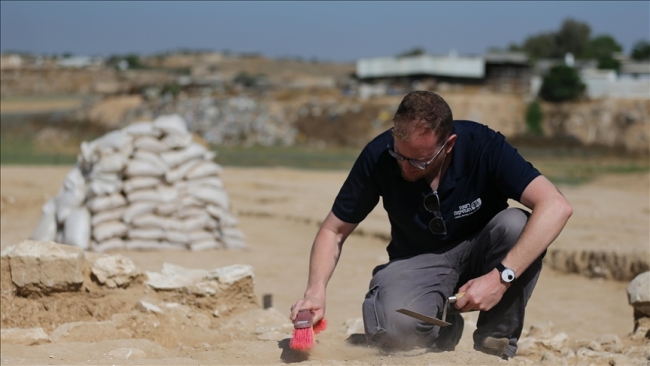"Israel" uses archaeology to legitimize occupation of Palestine, says scholar
"Israel" utilizes archaeological studies in the region as a means to further its occupation of Palestine, distorting findings and data for its own agenda, according to a religious scholar in Türkiye.
"Most nation-states have ideologically utilized archaeology, but what sets "Israel" apart is the much sharper contours it possesses," said Bilal Toprak, a faculty member at Duzce University in northwestern Türkiye.
"First and foremost, while other nation-states seek to preserve their locations, "Israel" pursues the claim of ownership over a land it has not inhabited for 2,000 years. In doing so, it has employed archaeology as a weapon of colonization, denial, and erasure," Toprak told Anadolu.
He argued that European Jews had chosen Palestine as a Jewish homeland for its "motivating aspect."
"They believed they would gather there when the Messiah came," Toprak said Zionism, holy scriptures, and religion were "instrumentalized."
He pointed to {Israel's} first prime minister, David Ben Gurion, who he said was an otherwise secular politician but made religious statements after becoming premier.
Archeology was indispensable for Ben Gurion, Toprak explained, serving "as a bridge to strengthen ties of current [Israeli] Jews to the ancient Jewish people. This strengthens the bond between the nation and the 'homeland'."
Tool for occupation, colonization
Toprak underlined the importance of places' names in colonization efforts, noting that [Israel] has used Hebrew and Biblical names for many areas ruled by Muslims for about 1,000 years.
"Only structures related to Judeo-Christian history were focused on. Hebrew names were given to areas in the Negev and Arava regions.
"Once considered 'empty slates,' Palestinian territories had been transformed into Jewish lands by the 1950s, with hardly any remnants left of Palestinian villages," said the Islamic scholar.
According to Toprak, the ancient mountaintop fortress of Masada in southeastern Israel is one example of Tel Aviv using archeology as a tool for occupation and colonization.
"In the 1960s, (Israeli) Commander Yigael Yadin reminded people of the Jews who resisted against the Romans at the fortress of Masada. He talked about how hundreds of people resisted and chose to commit suicide instead of surrendering to the Roman soldiers, thereby making history.
"The slogan 'Masada shall not fall again' is still used by soldiers in Israel against Arabs. Yadin conducted excavations here to prove the legend, but only 25 graves were reached. No instances of suicide were found in any of them," he added.
Erasing Palestinian culture
Toprak said Israel has also sought to remove the cultural fabric of Palestinians in areas it controls.
Forests were planted where once Palestinian villages stood in West Jerusalem, for instance, he noted, pointing to the Forest of the Martyrs on the city's outskirts, planted in 1951 by the Jewish National Fund.
Efforts to legitimize occupation with archaeological data has continued since the days of British control of Palestine, Toprak said.
Established in Britain in 1865, the Palestine Exploration Fund sent Thomas Lawrence, also known as Lawrence of Arabia, to map the region, Toprak said. "The President of the Palestine Exploration Fund, the Bishop of York William Thomson said that if one really wants to understand the Bible, they must first understand the land where it was first written."
According to Toprak, the foundations of Zionism were laid thanks to American theologian and archaeologist William Albright in the 1920s.
"Albright said that settler societies were able to survive thanks to occupation, expulsion, and ethnic cleansing. This was a huge opportunity for the Zionist occupiers," he said.
"Albright, who emphasized the superiority of the Judeo-Christian experience, drew a connection between the sacred land experience of the US and the myth of Jews returning to Palestine. Making the claim of a 'chosen land for chosen nation,' Albright based his evaluations not on actual archaeological data but on the Bible.
Emphasizing that archaeology is one of the most important tools for interpreting, understanding, and constructing the past, Toprak argued that even the names of museums in Israel showed it effectively uses archeology with names like the Israel Museum, Museum of the Jewish People, and Bible Lands Museum.
"Periodizations such as the 'Israeli era,' 'Hebrew era' are made. Through this, they claim to have been a great civilization in the past and assert their ownership of the lands they currently occupy."


